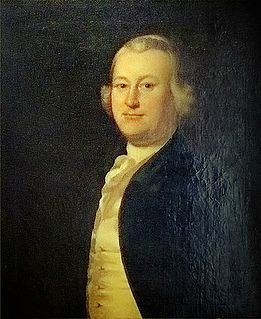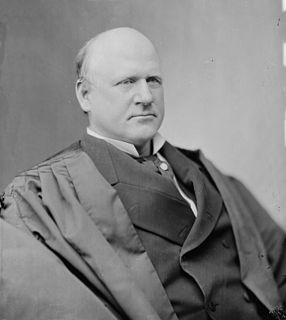A Quote by Joseph Story
This provision (the 4th Amendment) speaks for itself. Its plain object is to secure the perfect enjoyment of that great right of the common law, that a man's house shall be his own castle, privileged against all civil and military intrusion.
Related Quotes
The Thirteenth Amendment to the Constitution of the United States was enacted in 1865 by martial law. The Fourteenth Amendment was enacted in 1868 by martial law. The Fifteenth Amendment was enacted in 1870 by martial law. Military occupation of the Southern states did not end until 1877, twelve years after the end of the Civil War.
It is rare to find a man who believes in his own thoughts or speaks that which he is created to say. As nothing astonishes men so much as common sense and plain dealing, so nothing is more rare in any man than an act of his own...feel yourself, and be not daunted by things...The light by which we see this world comes out from the soul of the observer.
Conscience is the most sacred of all property; other property depending in part on positive law, the exercise of that being a natural and unalienable right. To guard a man's house as his castle, to pay public and enforce private debts with the most exact faith, can give no title to invade a man's conscience, which is more sacred than his castle, or to withhold from it that debt of protection for which the public faith is pledged by the very nature and original conditions of the social pact.
Civil rights are those which appertain to man in right of his being a member of society. Every civil right has for its foundation some natural right pre-existing in the individual, but to the enjoyment of which his individual power is not, in all cases, sufficiently competent. Of this kind are all those which relate to security and protection.
Why not include a provision that everybody shall, in good weather, hunt on his own land and catch fish in rivers that are public property and that Congress shall never restrain any inhabitant of America from eating and drinking, at seasonable times, or prevent his lying on his left side, in a long winter's night, or even on his back, when he is fatigued by lying on his right.
Compelling a man by law to pay his money to elect candidates or advocate law or doctrines he is against differs only in degree, if at all, from compelling him by law to speak for a candidate, a party, or a cause he is against. The very reason for the First Amendment is to make the people of this country free to think, speak, write and worship as they wish, not as the Government commands.
The question so often asked of modern painting, "What is it?", contains more than the dull skepticism of the man who is not going to have the wool pulled over his eyes. It speaks of a fundamental placement in relation to the work, that of a voyager in the world coming upon a strange object. The reader reconstitutes the work by his active participation, by approaching the object, tapping it, shaking it, holding it to his ear to hear the roaring within. It is characteristic of the object that it does not declare itself all at once, in a rush of pleasant naïveté.
To live his life in his own way, to call his house his castle, to enjoy the fruits of his own labour, to educate his children as his conscience directs, to save for their prosperity after his death -- these are wishes deeply ingrained in civilised man. Their realization is almost as necessary to our virtues as to our happiness. From their total frustration disastrous results both moral and psychological might follow.
































